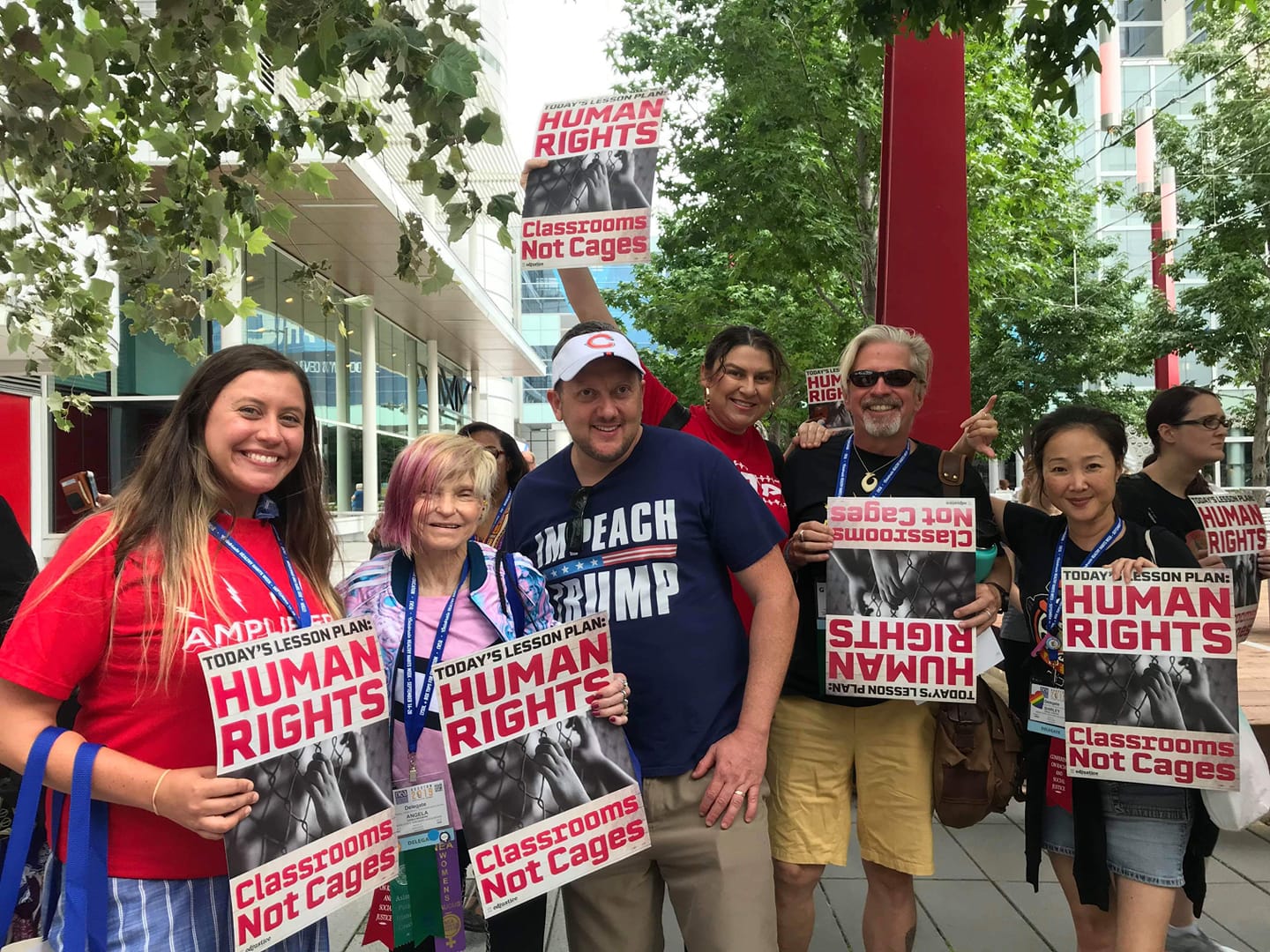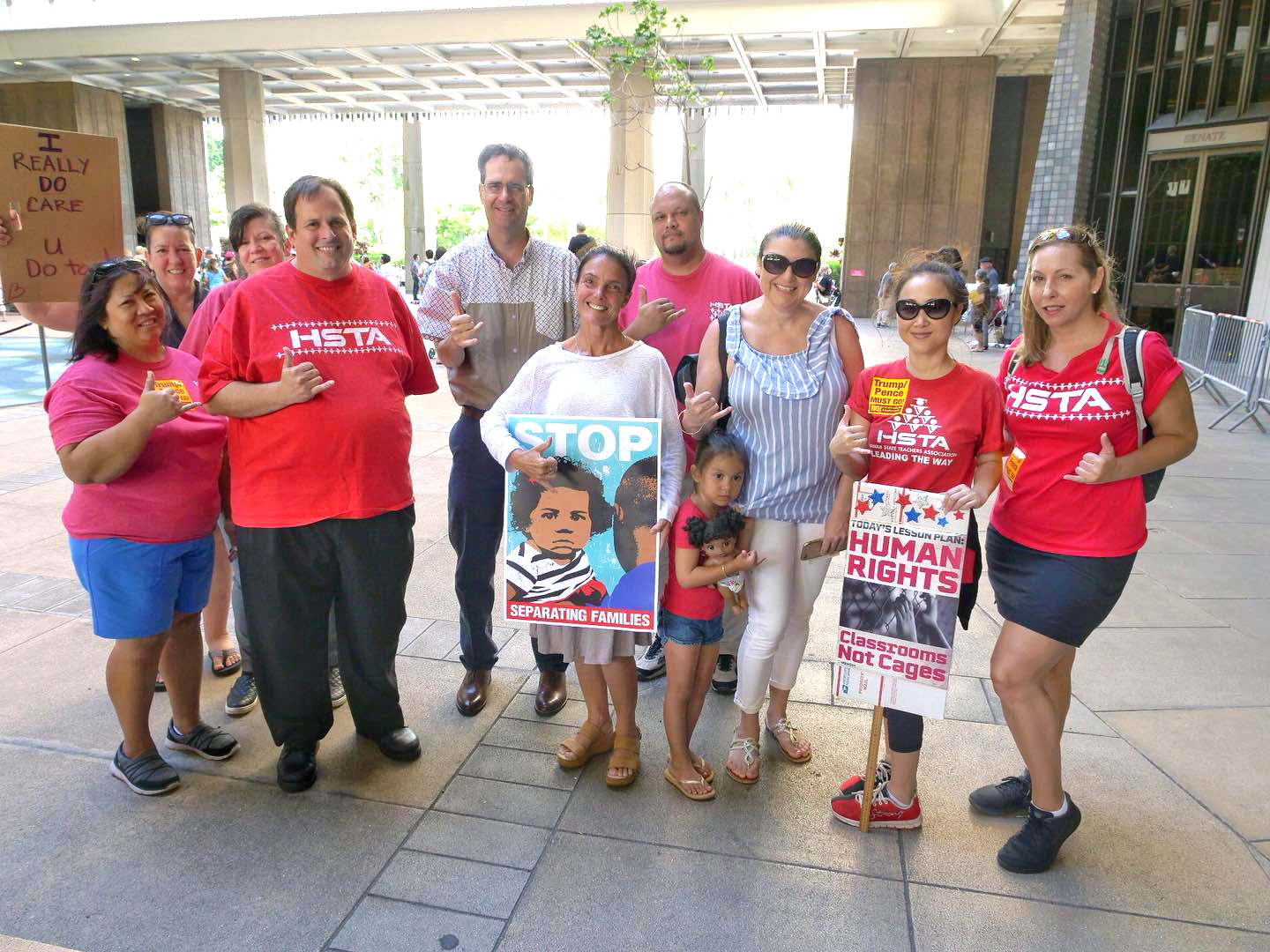Click here to watch this video on YouTube.
Hawaii State Teachers Association leaders and members joined hundreds at the Hawaii State Capitol Friday, July 12, to protest inhumane conditions faced by refugees at federal immigration detention facilities.
The effort, called Lights for Liberty, was part of a national vigil to end human detention camps.
"Right now, because of the policies of the Trump administration, we have 11,000 children being held in detention camps," said HSTA President Corey Rosenlee. "They're not being provided showers or water. We have children sleeping on floors, no access to soap or even to toothpaste."
"I had the opportunity in Houston to visit one of these detention centers, which are dotting our country now, and we want the Trump administration to know that our children belong in classrooms, not cages," said HSTA Vice President Osa Tui Jr. "We teach in our classrooms the Golden Rule—to do unto others as you would have them do unto you, and right now, what we're doing to these poor children and families is not what we should be doing."
Thousands of Americans took to the streets to protest the conditions that children and families face at immigration facilities across the country.
"We're asking that the Trump administration, U.S. House of Representatives, the Senate, and the courts to end this practice and make sure we have better circumstances for all children," Rosenlee said.

From left: Victoria Zupancic, Angie Miyashiro, Justin Hughey, Christine Russo, David Negaard, and Shirley Yamauchi gathered on Thursday, July 4, during a protest march outside a federal immigration detention center in Houston.
Hawaii teachers protested outside Houston detention center July 4
More than 20 HSTA delegates to the National Education Association's Representative Assembly joined at least 1,000 delegates from across the country in a protest march outside a Houston federal immigration detention center Thursday evening, July 4.
After the conclusion of NEA RA business, they made the 15-minute walk to from the Houston convention center to the detention facility, ironically located on Emancipation Avenue in downtown Houston. They held signs that said, "Human rights. Classrooms not cages."
NEA Secretary-Treasurer Princess Moss and the Texas state president and vice president attended the event and addressed the group.
HSTA Human and Civil Rights Committee Chair Jodi Kunimitsu, a Maui High teacher who participated in the march, said, “We need to stand in solidarity to protect all children always.”
HSTA Vice President Osa Tui Jr., the McKinley High registrar, was also part of Thursday's protest.
“While we were chanting ‘Up, up for education, down, down with deportation,’ our hearts were with the children being held in cages at facilities like this around the country,” Tui said.
NEA RA calls for end to immigrant detention
During the NEA's Representative Assembly, educator delegates from around the country passed a proposal for the NEA to call on the Trump administration, the U.S. Senate and House, and the courts to immediately end "the detention and criminalization of immigrant children and their families; including an end to ICE raids, which inflict charos, fear and instability on entire communities."
Specifically and immediately, NEA will call on the U.S. government to address the human rights violations for which it is responsible in detention centers across the country by demanding that:
- Immigrant children currently incarcerated by the U.S. government be treated as human beings with infinite worth and potential, and not be exposed to conditions that harm or traumatize them.
- Detention facilities be open to visits by doctors, educators, social workers, clergy, and other children’s advocates.
- The U.S. government comply with the guidelines for basic standards of care of children set forth by the American Academy of Pediatrics.
- The U.S. government stop sending children and immigrant families to for-profit detention centers.
To achieve the above, NEA will:
- Instruct our general counsel to challenge such policies and practices in the courts and other venues by leading or joining cases with advocacy partners;
- Call on members and affiliates to seek sponsors and support for legislation that protects immigrant families, the rights of asylum seekers, and the humane treatment of all immigrants;
- Oppose ICE raids that terrify peaceful communities and endanger children who are left without caregivers when parents are arrested and detained;
- Urge all presidential candidates to develop plans for comprehensive immigration reform that include specific ways to ensure the humane treatment of all immigrants and ways to end ICE raids and family separations;
- Partner with immigrant rights’ organizations to inform our members and the families they serve of the civil and human rights of undocumented people through community engagement and specifically partner on training such as know-your-rights training;
- Initiate and support networking locally so that our members and public can jointly engage in initiatives and actions on immigrant justice;
- Promote the efforts of our affiliates and partners to protect immigrant students and families from the harm and trauma caused by fear of deportation, anti-immigrant violence, and family separation;
- Mobilize members to contact their elected officials, participate in protests, and disseminate advocacy materials on urgent immigration issues;
- Expand NEA’s rapid response social justice activist network to engage and activate our members and allies on key immigration priorities; and
- Provide information to state affiliates on how they can gain access to assist refugees being held in detention centers, how they can teach, provide social work servicing, psychology services, provide soap, toothbrushes and other sanitary needs to refugees.
More than 100 delegates from Hawaii, along with 6,000 from across the country, spent last week in Houston for the NEA Representative Assembly. It is the largest democratic deliberative assembly in the world.
Meetings took place July 3–7 at the George R. Brown Convention Center, where members set policy and charted the direction of NEA business to further support public education in America.

